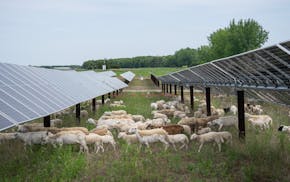Google has ramped up a lobbying offensive in Minnesota to influence tax breaks and regulations for data centers, according to three state lawmakers.
This influence campaign comes more than two years after Google abandoned its last known plan for a data center in Minnesota, a $600 million project in Sherburne County.
The tech titan won't say if it's pursuing a new data center in Minnesota. Google declined to comment both about its interest in the state and at the Legislature.
But Google's parent company, Alphabet Inc., is planning to expand its data center capacity, saying in April it would spend $75 billion this year on computing strength for its artificial intelligence plans.
Google representatives have met with lawmakers, environmental groups and consumer advocates.
Rep. Greg Davids, a Republican from Preston and co-chair of the House taxes committee, said the company is calling for more favorable tax breaks. Two DFL lawmakers said Google is part of negotiations on other controversial issues, such as proposals that would regulate the water and energy use of data centers and make companies release more information about their operations.
"They're in the game," Davids said .
Google's pressure also comes at a pivotal moment for data center policy in the state. Lawmakers are negotiating a package of legislation that could set ground rules for what is essentially a new industry.
There are small data centers in the state, but none of the scale that tech companies are eyeing. Facebook's parent company is building a data center in Rosemount, and developers have proposed at least 10 others.
Many of those developers are lobbying the Legislature, too.
Amazon wants to ease some environmental regulations for backup diesel generators at its proposed Becker data center. The trade group Data Center Coalition, which represents Meta Platforms, Amazon, Microsoft, Google and other developers, has publicly worked to extend and sweeten tax incentives for these projects.
At the same time, some DFLers hope to put new limits on an industry they fear will threaten state climate goals, use too much water and operate with too much secrecy.
Google works the Legislature
Alphabet Inc. is one of the world's largest tech companies. Along with peers like Amazon, it has global plans to build data centers that support its ambitions for artificial intelligence.
In October, a Google employee told the Minnesota Public Utilities Commission (PUC) its energy use had grown fivefold between 2012 and 2023 because of skyrocketing demand for YouTube, Google Maps, Gmail and other services.
At the Legislature, Google improved its lobbying muscle by hiring Michael Noble, former leader of the prominent climate advocacy nonprofit Fresh Energy and an ally of Gov. Tim Walz. Noble directed the Minnesota Star Tribune to Google's public relations team for comment.
Davids said Google, like the other data center companies, wants to extend Minnesota's lucrative sales tax breaks for data centers and alter the incentives to make refunds on buying equipment an up-front exemption.
Rep. Patty Acomb, DFL-Minnetonka, is co-chair of the House's energy committee and has led the charge for tougher laws on data centers to regulate their water and energy use, impose fees to pay for conservation and require more public disclosure.
Acomb said Google told her the company is interested in being in Minnesota because of the state's clean energy goals.
Google has pledged to be "climate-conscious" in using water to cool its data centers. For example, Google says it chose to use an alternative cooling method to preserve water at a data center in water-scarce Arizona. The company has a water stewardship program that involves improving the health of watersheds.
Google also wants to run on carbon-free energy at all hours by 2030, said Tyler Huebner, a member of the energy market development team at Google, during the October hearing in Minnesota.
Acomb said Google has been "reasonable" about her effort to impose new public disclosure requirements, giving feedback about what they do in other states rather than "just saying no reporting."
The Data Center Coalition, by contrast, has said disclosing its water and electric use in Minnesota could expose trade secrets to competitors or make data centers targets for terrorists or foreign adversaries.
Sen. Nick Frentz, DFL-North Mankato, chairs the Senate's energy committee. He said Google is part of ongoing discussions and is largely aligned with the Data Center Coalition. Frentz and Acomb couldn't remember Google lobbying them on data centers in recent years.
Google has also met with the consumer advocate nonprofit Citizens Utility Board of Minnesota, said executive director Annie Levenson-Falk. Her organization is pushing for new laws aimed at ensuring data center companies, not other utility customers, shoulder the costs from adding these large power users to the grid.
Google reaches out to utility regulators
Google has also been more active than in previous years at the PUC, which has the power to approve or deny electric contracts for data centers that get energy from investor-owned utilities like Xcel Energy and Duluth-based Minnesota Power.
In June 2024, Google was one of five top sponsors for an annual conference for utility regulators held in downtown Minneapolis and organized by PUC Chair Katie Sieben. Google paid at least $20,000 for that sponsorship and had a booth at the event.
The company is a top sponsor again for the 2025 event in Indiana, where Google is planning a $2 billion data center campus.
At the PUC hearing in October, Google said it needs steady clean power that can smooth out the intermittent production of wind and solar.
Google's Huebner, a former utility regulator in Wisconsin, also said the company is developing new policies across the country that allow it and other power customers to subsidize clean energy projects, such as a deal to build a geothermal plant in Nevada.
This March, Google formally asked the PUC to create those regulations in Minnesota. It appears to be the company's first filing at the PUC relevant to data centers. Frentz said Google has been pushing the concept at the Legislature as well.
Minnesota lawmakers are still negotiating data center policy as the Legislature enters its final week of the 2025 session.
Davids said data centers will be an economic positive and extending the tax breaks is a "top five" priority. He fears new rules and regulations might push data center companies to build in Wisconsin or Iowa.
"This is such a big deal that this is going to take leadership in the House, leadership in the Senate, the governor's office, are going to have to work on putting this together," Davids said.

Why now might be the best time to make a deal on boats, ATVs and other powersports
Lupine is starting to bloom in Minnesota. Here's where to find it.

Xcel lets loose a small army of hungry sheep to keep its solar farm in order

Anderson: In early June, Minnesota fish are begging to be caught. Won't you help?

